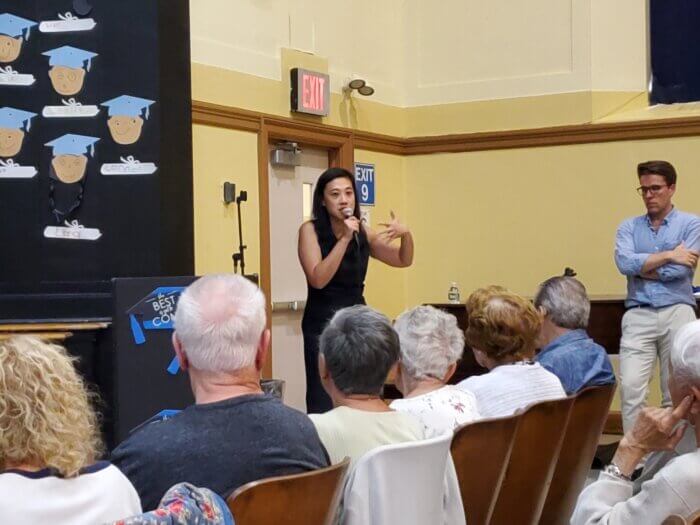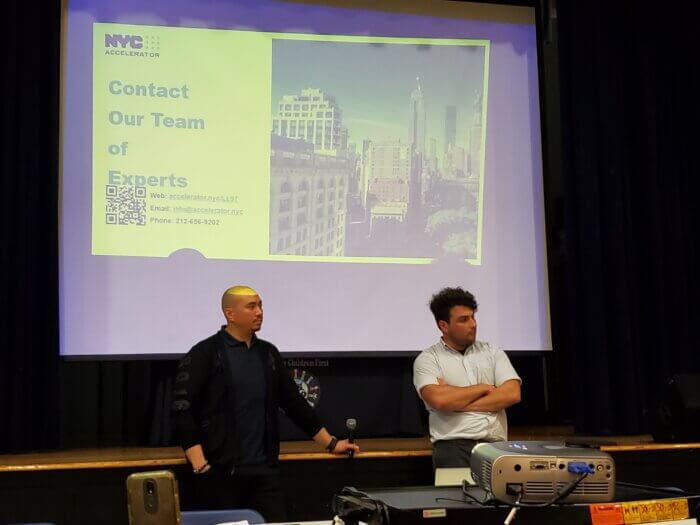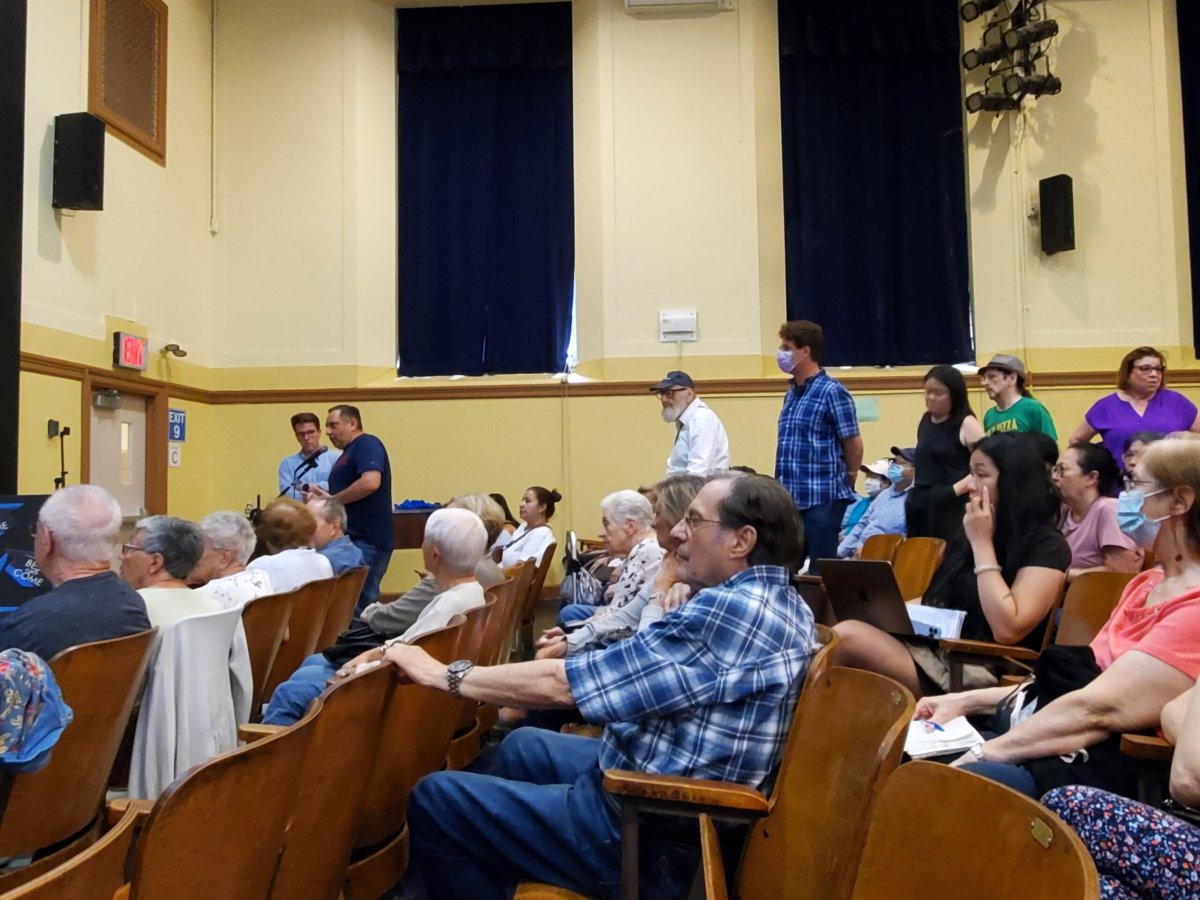Queens Councilwoman Sandra Ung hosted a town hall to discuss the implementation of Local Law 97 (LL97) and the programs available to co-op and condo owners to bring their buildings into compliance on Tuesday, June 20, at P.S. 214Q. Tarek Arafat of the NYC Department of Buildings and Joseph Staluppi of the NYC Accelerator joined Ung at the event.
According to Ung, the main focal point of this town hall was for DOB to attempt to address the many concerns and questions regarding the law’s implementation. NYC Accelerator was meant to try and provide guidance as to how building owners can improve their energy efficiency so that it is in compliance with Local Law 97 (LL97).
Passed by the City Council in 2019, LL97 requires buildings in New York City of more than 25,000 square feet and certain multi-building properties to meet new energy efficiency and greenhouse gas emissions limits by 2024, with the goal of reducing greenhouse gas emissions across the city 40% by 2025 and 50% by 2030. This has led to many residents of co-op and condo developments to be concerned about facing hefty fines as early as next year if they are unable to take steps that would reduce their carbon footprint and greenhouse gas emissions.
Many of the residents whose homes don’t currently meet the 2024 limits argue the law’s implementation will result in draconian fines. They allege that certain properties are put in position where it is unavoidable to face penalties, even if they voluntarily met or exceeded previous targets for emissions reductions and otherwise complied with all laws in effect when they designed, constructed and renovated their buildings. Greenhouse gas emissions exceeding a building’s greenhouse gas limit will be penalized $268 per metric ton of carbon dioxide equivalent.

“Like many of you, I share concerns about the financial impact that this bill will have on the co-op and condo owners right here and across the city,” Ung said. “Over the past few months, I’ve had numerous discussions with colleagues in the agencies and local co-op and condo owners on possible solutions to mitigate impacts. On the legislative front, I’m working with my colleagues and other City Council offices on several bills to assist condo and co-op owners.”
According to Arafat, approximately 80% of New York City buildings are already in accordance with the 2024 requirements of LL97. On the subject of financial penalties for not being in accordance, Arafat said the policymakers designed it to exceed the cost of work that would be needed at the building to meet the goal. This is meant to encourage people to get the work done as soon as they can.
Some in attendance expressed concern over this idea potentially backfiring. There was worry that some contractors could overcharge for the work needed to be done at certain homes as well as the time it may take for it to be completed. Additionally, some asked about the possibility of having their fines reimbursed if they end up getting the work done to meet the requirements or having buildings built before 1965 be exempt from having to meet these requirements.
“We’re trying to make it so that the penalties are open to mitigating factors,” Arafat said. “We’re trying to avoid collecting penalties, giving every opportunity for every owner of every building to do the work.”
According to Staluppi, NYC Accelerator is available to provide free assistance to residents as they attempt to meet the requirements of LL97. In addition to providing technical assistance for building upgrades, NYC Accelerator can deliver expert advice to determine a building’s requirements and help meet local energy laws, connect buildings with service providers for energy and carbon reduction projects and identify applicable financial incentive programs and financing. However, some in attendance weren’t thrilled over these programs for fear of having to take out loans.

Many of the buildings in Flushing that those in attendance live in were built in the 1950s and 1960s. One resident expressed concern that electrical fires could result from attempting to convert the cloth wiring in these buildings. Additionally, he was worried that taxes would increase across the city in order to pay for the financial incentive programs.
“May I make the suggestion that we consider, given the fact that this is so premature, maybe pushing [LL97] back?,” one attendee asked. “Allow people the time to understand it better. Allow the government agencies the time to do the renewable energy they say they’re going to do, so that we can do what we need to do. We want things to be green, but we’re not going to get there until everyone is on the same page. Allow every single one of these people the time to understand what needs to be done and give them the time that they need to come up with the money and give the city the proper understanding of how to help these people.”
Another resident called upon Ung to sign onto a proposed legislation that would delay LL97 from being implemented for seven years. According to Ung, she is currently considering this proposal, as well as others that are currently on the table.
“I held this town hall because I have talked to many of you and I also recognize that there may have been some out there who did not know this law existed and did not know it was going to be implemented next year,” Ung said. “I understand this is a very passionate issue. This is about your homes. This is about your life savings that you’ve put into these homes and you want to keep these homes. I want to assure all of you every single possible solution, possible implementation, including the delay [of LL97], is on the table with me. You’ll be hearing more updates with me about this. This is only the beginning.”
While Ung noted there are not currently any votes related to this subject on the table, this can change very soon. She intends to keep the community updated when it comes to LL97 and any proposed bills that may affect it.
Those who may have questions about how LL97 may impact a particular building are recommended to contact the NYC Accelerator. Individual assistance can be reached by calling them at 212-656-9202, emailing them at info@accelerator.nyc or by going to their website at accelerator.nyc.




































